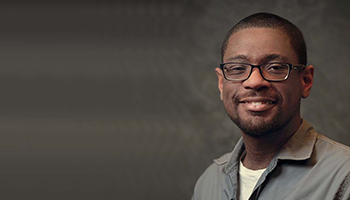HOW CAN WE HELP YOU? Call 1-800-TRY-CHOP
In This Section
Uncovering the Unexpected: Q&A With Jean-Bernard Lubin, PhD, New Diversity Fellow
 It’s been an exciting week on Cornerstone, as we’ve gotten to know the newest recipients of the Postdoctoral Fellowship for Academic Diversity and learn about the richness of experience they bring to our research community.
It’s been an exciting week on Cornerstone, as we’ve gotten to know the newest recipients of the Postdoctoral Fellowship for Academic Diversity and learn about the richness of experience they bring to our research community.
Closing our three-part Q&A series is Jean-Bernard Lubin, PhD, who discovered the perfect place to pursue his research interests in the microbiome and its effects throughout the lifespan. With the goal of directing the course of those effects with therapeutic interventions, Dr. Lubin brings his passion for bacterial genetics to CHOP.
Tell us about your background and what compelled you to apply for the Postdoctoral Research Fellowship for Academic Diversity?
I was born in Brooklyn, N.Y., but grew up mostly on Long Island. It was in high school that I developed an interest in science starting with a 9th-grade project of the effect of copper sulfate on the neurological function of fiddler crabs. That project must have had a serious influence on me as I ultimately decided to enroll at Penn State University as a chemistry major with the goal of becoming a toxicologist. During college, however, coursework in evolutionary genetics pushed my interests more into the realm of biology, and I decided to pursue graduate courses that involved both fields.
After transferring to State University of New York Farmingdale to be closer to home, I did undergraduate research in immunology to gain experience in the lab. Now with an attraction to biochemistry firmly entrenched, I enrolled in the PhD program at the University of Delaware and was selected for the NIH-sponsored Chemistry Biology Interface Program. Despite having little real interest in bacteria at the time, I joined the bacterial genetics lab of Dr. E. Fidelma Boyd with the hope of gaining knowledge in evolutionary genetics. This is where I found that I actually loved studying bacteria! The microbial world is the biochemist’s dream, with the ability to produce novel compounds and reactions putting eukaryotic cells to shame. Studying amino sugar metabolism in bacteria in graduate school paved the way for my current goals of studying how bacterial-derived compounds affect host systems.
I applied for the research fellowship because working at CHOP gives me an excellent opportunity to train in the microbiome field. This fellowship makes available resources from two of the best research institutions in the world — CHOP and Penn — and gives me the time and support I need to pursue a tenure-track faculty position in the near future.
What does diversity in research and science mean to you?
Diversity in research means changing the perception of what it means to be a scientist. It’s important that young children won’t imagine “scientist” and picture only one type of person, and forgo pursuing this profession because they don’t fit that image. It means to provide a role model for kids who look like me and have similar backgrounds, to show them there are no closed doors if you work hard enough, and that anyone can achieve their dreams.
What are some research projects that you’re excited about?
I’ve always been fascinated with microbiomes and how communities of bacteria interact with each other and their hosts. My current research allows me to explore these dynamics by creating small, defined communities of intestinal bacteria that can be introduced into germ-free mice with different genetic backgrounds. By trimming down the microbiota from hundreds of species to fewer than 10, this allows us to determine exactly what each member of the community is responsible for. By using mice with different mutations in genes that control immune responses, these small bacterial communities will allow me to investigate how the immune system shapes the microbiome and influences what microbes colonize the intestine and the metabolites produced by the bacteria in response to changing environmental and host signals.
Currently, I am using this technique to develop a general model of the pediatric intestinal microbiome. This will allow me to determine the important differences in an infant’s microbiota versus an adult’s and learn how these differences affect acquisition of childhood pathogens and autoimmunity.
What inspired you to study infectious diseases in the pediatric population? What do you hope to achieve in your research?
It has become more and more evident that the interactions a person has with bacteria very early in development can have drastic consequences throughout the lifespan. These interactions can be positive or negative, but currently it’s not well understood what even controls these outcomes and what bacteria are responsible for them. This is a burgeoning field with wide open avenues to explore that coincides with my interests in microbial biochemistry and evolution.
I’m hoping to further knowledge of which bacteria play important roles in healthy human development and investigate effects of bacterial-derived compounds on the host immune system. Ultimately, l would like to be involved in research that looks to genetically manipulate commensal bacteria for the use as therapeutics that work in concordance with human biology and the microbes that already reside in us all.
When you’re not working, do you have a favorite pastime, spot to relax, enjoy a meal, or be active?
My favorite pastimes are reading and watching soccer. I gravitate mostly to the fantasy and sci-fi genres that involve a significant amount of world-building, but I am generally open to most others. I regularly follow the Arsenal, my favorite soccer club, and the English premier league as well as the American and French leagues. Other than that, I like bowling, racquetball, and listening to live music. My weekly pub trivia night has become essential downtime, where I can regularly get together with some old friends and have some fun.